SMSM – Missionary Sisters of the Society of Mary
Collaboration with the Marist Sisters
Marist Sisters and SMSM have had few opportunities to collaborate in Mary’s work except in projects that involve several branches of the Marist family.
However, as Third Order Regular of Mary (TORM), sisters were given the opportunity to prepare the way in two Pacific missions.
The growing European population in vicariates under British rule, required sisters who could speak and teach English. During a visit to Lyons in 1891, Bishop Julien Vidal invited the Marist Sisters to take over the school in Levuka, Fiji, which the TORM had started. When the superior of the TORM novitiate in France, Madame des Groues, was asked if she opposed this she replied: “Oh, no! The moment that my daughters cannot fill this post I have no right to oppose the work of God and the good of souls.” She told the community about the change, adding, “Remember, my daughters, that you are to dig the foundations and prepare the place for others”. 1
In February 1924 the Marist Sisters took over the English school in Nuku’alofa, Tonga, at the invitation of Bishop Joseph Blanc 2. Then, four years later, the convent and school in Houma was handed over to the Marist Sisters who felt the need of a second community and in a village setting. 3
In retrospect, the SMSM see this handing over as an essential aspect of life as missionaries. Turning responsibility over to local people, has been the reality in recent decades allowing SMSM to respond to other needs in mission.
Collaboration with Marist Laity
The SMSM are historically and spiritually connected with lay Marists. The Pioneer Sisters were enrolled as members of the Third Order of Mary. For years much of their spiritual reading and practices were from the Manual of the Third Order – they imbibed its spirit, and several corresponded with Tertiaries back in Lyons. Their name was Sisters of Charity of the Third Order of Mary in the Missions of Oceania.
In the days of the Pioneer Sisters and those who followed them, often only one sister was in a school. Older students teaching younger ones was a most effective way of passing on knowledge. As students were often boarders, and followed the church prayers and practices of the sisters, these students imbibed the Marist spirit.
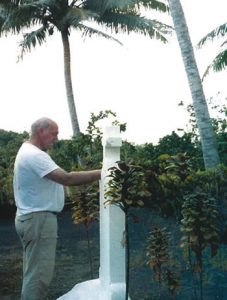
Fr John Craddock SM at the grave of Marie Françoise Perroton, Pioneer Marist laywoman and Missionary Sister, -- on the island of Futuna, April 2004
In December 1850 Marie Françoise Perroton was teaching about 100 girls in Wallis. When, at Bishop Bataillon’s request, she left there in August 1854, some young women she had trained decided to continue her work, establishing two communities of girls.
Then, as now, a powerful way of collaborating is through presence and encouragement. Sisters take part in gatherings of the Third Order of Mary, Marist laity meetings, Marian Mothers, and also in meetings of the Champagnat family.
Collaboration with the Marist Family
For fifteen years, a significant contribution was made to Church renewal in New Zealand through Marcellin Hall. And in France, there was the base for the Marist family project at St Priest, Lyons. Members from the four branches continued in their various ministries and community residences, coming together regularly as a group.
The Marist Volunteer programme that was sponsored by all branches of the Marist family in the USA for some years allowed young people to live in a local Marist community and share in ministry.
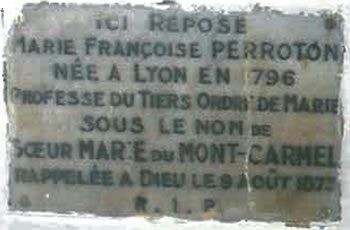
“Here lies Marie Françoise Perroton,
born in Lyons in 1796. Professed in the Third Order of Mary under the Name of Sister Marie of Mount Carmel. Called home by God 9 August 1875 R.I.P.”
Educational institutions with family collaboration include a secondary school in Senegal; St Bede’s College, Savarekareka, in Fiji; the origins of the Corpus Christi Teachers’ College in Suva; the initial collaboration for the Form 6 students at the Catholic Senior School in Samoa.
Over recent decades, there have been Marist Family renewals in Fribourg, several in Rome, in Belley (France), and in New Zealand at Marcellin Hall. These are opportunities to get to know other members of the family better and to encourage one another in the work of Mary.
Every year in France representatives from the five branches meet to continue research in Marist studies and spirituality.
In 2016, Father John Hannan, then Superior General of the Society of Mary, wrote a letter entitled, Time to Look Outward. He stressed that an important orientation for the Society of Mary was “to work untiringly with the laity and other branches of the Marist family”. 4
The early Marists believed that they were chosen as members of Mary’s family precisely to do her work, a work of mercy. They were convinced that this work was best done by working together.
Marists collaborating with people of good will continues to be a Gospel way of moving forward.
1 Mother Marie Pia SMSM, Madame Adele Marie Troussel des Groues, Mother Marie de la Croix, TORM, 1835-1898 , Rome, April 2001, p. 39.
2 M.M. Edith (Tonga), notes, South Pacific Province archives, Mangere, Auckland.
3 Ibid
4 John Hannan SM, Time to Look Outward, No. 183 – XIII, 8, 27 March 2016 no. 25.

Marist Family Retreat Team, Futuna Retreat House, Wellington, September 1996
Br Romuald Gibson FMS, Sr Margaret Arrowsmith SMSM,
Fr Noel Delaney SM, Sr Marie Challacombe SM
This article is adapted from a paper delivered in Auckland in 2017. The paper was published in Forum Novum on the Society of Mary website -- www.maristsm.org/en/forum-novum.aspx -- and it is used with the permission of Fr Alois Greiler SM, the editor of Forum Novum.
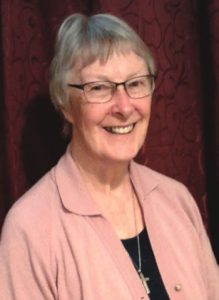
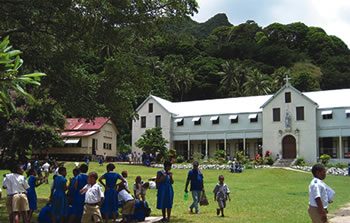
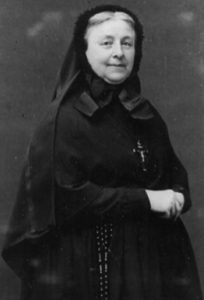
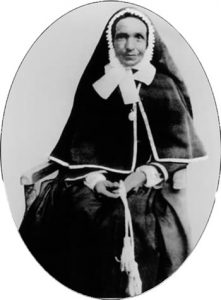
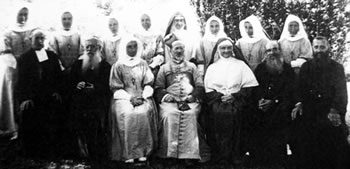
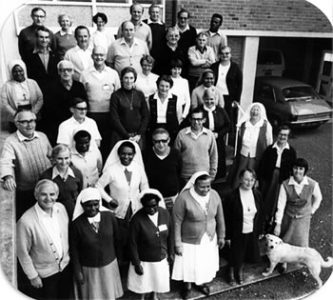
 Entries(RSS)
Entries(RSS)